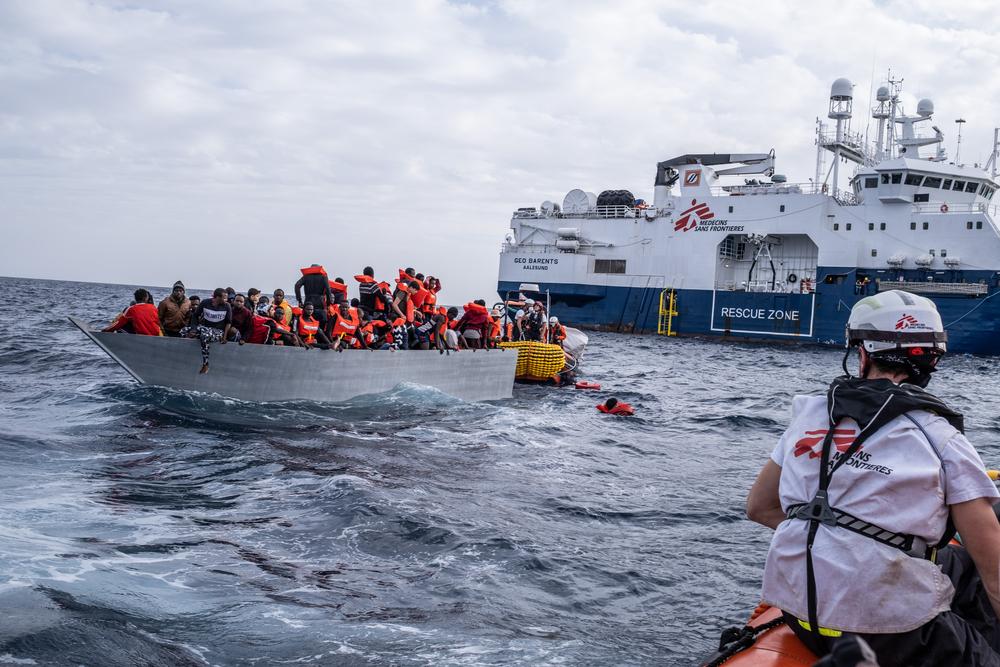Every year, thousands of people fleeing war, persecution and poverty at home attempt the treacherous journey across the Mediterranean. Countless lives are lost on the way.
Closing safe and legal options for people to reach Europe pushes them further into people smugglers' networks. In Libya, the detention of migrants and refugees is a thriving enterprise of kidnapping and extortion.
MSF is saving the lives of people trying to cross the central Mediterranean Sea with our own search and rescue vessel, Geo Barents. We also provide assistance to people held in Libyan detention centres and those arriving in Europe.
Explore our 360° video by simply using your mouse to navigate or tilting your phone. Click, drag, and uncover every angle!
Welcome to the Médecins Sans Frontières‘ Search and Rescue ship: the Geo Barents.
Since 2014, civilian rescue ships are filling the void that European States have deliberately left after discontinuing their state-led search and rescue operations. NGOs have played an essential role in filling this gap and preventing more lives being lost at sea, while consistently upholding applicable international and maritime laws.
Until today, EU member states continue to obstruct civilian efforts to rescue people in distress at the Mediterranean Sea. We call on the EU to adopt policies that protect the lives, health and safety of all people. The EU Member States must comply with existing international and maritime laws as well as guarantee the operational space for civil search and rescue actors.
The M/V Geo Barents is sailing under the Norwegian flag. The ship’s overall length is 76.95 metres long. It has two decks for survivors; one for men and one for women and children. There is a clinic, a midwifery room and an observation room for all the medical activities. The ship has two fast rescue boats to launch during rescue activities, and a helideck for medical evacuation.
On 23 February 2023, the Geo Barents was the first Search and Rescue NGO vessel to be detained for 20 days, following the release of Law 15/2023 in Italy.
In 2023, Italy introduced the new Law 15/2023 which restricts search and rescue vessels from carrying out more than one rescue operation at a time, as the legislation states that search and rescue vessels should navigate towards the assigned place of safety after a rescue operation, without delay; this implies that vessels should not be providing assistance to other boats in distress.
Explore our 360° video by simply using your mouse to navigate or tilting your phone. Click, drag, and uncover every angle!
Geo Barents 360° Rescue training by day: various manoeuveres in the rhib.
Here you are watching a training session on how to rescue a person out of the water.
Our search and rescues teams regularly train to be prepared for different types for rescue scenarios.
Since Mai 2021 until now, the Geo Barents has rescued 8,576 people in a total of 121 rescue operations. The MSF team on-board of the ship recovered the bodies of 11 people and assisted in the delivery of a baby.
Since 2014, 27,676 people have been recorded as missing or have lost their lives in the Mediterranean. The Mediterranean is the deadliest migration route in the world.
Explore our 360° video by simply using your mouse to navigate or tilting your phone. Click, drag, and uncover every angle!
Geo Barents 360° Rescue prep on board: preparing the sleeping deck for survivors.
There are two living decks on the Geo Barents. One for men and one for women and children.
This is the deck for women and children: the crew is preparing for the incoming survivors and is changing the sleeping mats.
Among the survivors are also pregnant women, children and babies. The youngest person rescued was a 9 months old baby. In December 2022, the medical team assisted in the first baby delivery.
Our medical team consists of medical team leader, a doctor, a nurse, psychologist and midwife.
In general, on the Geo Barents we mainly treat hypothermia, fuel burns, broken limbs and patients who survived torture and sexual violence.
Survivors have often been on the move for a long time. On their way, people have been exposed to violence, gunshot or stab wounds and they often suffer from poorly healed fractures or infected wounds.
Explore our 360° video by simply using your mouse to navigate or tilting your phone. Click, drag, and uncover every angle!
Geo Barents 360° Rescue training by night: various manoeuveres in the rhib.
The crew is preparing for a night rescue training session and they move rescue rings from the outside area to the inside area. Reports about boats in distress also come in at night, so our team is always trained to perform rescues at different conditions.
Boats in distress can contact the Alarm Phone volunteer service at any time, a transnational network that alerts about people in distress and relay the distress calls to nearby ships and maritime rescue coordination centres to proceed with rescue operations in the Mediterranean Sea.
We will then be informed about the last known position and in case we are within reach, we can begin with a search and rescue operation.
But sometimes, we spot boats in distress from the bridge of the ship; once the ship arrives to the Search and Rescue region, our team starts 24-hour watch, looking for possible boats in distress.
Explore our 360° video by simply using your mouse to navigate or tilting your phone. Click, drag, and uncover every angle!
Geo Barents 360° After a rescue: male sleeping deck by night
Survivors change their wet clothes and are provided with food and water, they are sleeping on deck.
Many of those fleeing have experienced extreme forms of violence and exploitation on their way. In particular, people who have fled from or through Libya and Tunisia report torture, sexualised violence, murder, extortion and slavery.
Once the survivors are on board they receive a medical check and are treated if necessary.
